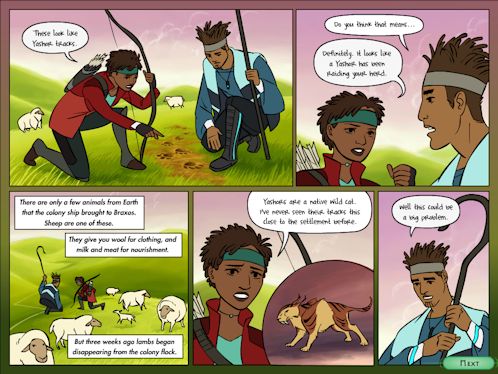I’ve had a few friends suggest the game Quandary to me, but for whatever reason, I never sat down and checked it out until The Mission List selected me to write a sponsored post about it. Quandary is a free online game targeted for kids ages 8-14 to help them learn how to recognize ethical issues and deal with challenging situations in their own lives, something especially important for kids on the autism spectrum, but relevant to anyone. That may not sound like a lot of fun at first blush, but the cool part is that players “lead a new human colony on a distant planet. They must make difficult decisions in which there are no clear right or wrong answers but important consequences – to themselves, to others in the colony and to the planet Braxos.” As a player, you are the captain of Braxos, and therefore responsible for making decisions (along with the aid of a grand council back on Earth) that will affect the lives of everyone in your new civilization.
We had a conference call with the game developers that walked us through the first of three episodes: Lost Sheep. This gave us a quick overview of gameplay – which was designed to have no significant learning curve – and showed us one possible outcome that our choices could lead to. I was very excited during the conference call, and I played through the entire game myself after the session was over. (Average gameplay lasts 20-30 minutes per episode. I spent a lot less time finishing each episode than TJ did, both because of life experience and because he wanted to click on the audio for every speech bubble, while I was content with reading things with just my eyes.)

Even as an adult who considers herself empathetic with a good moral compass, the decisions were still challenging to make. It is not possible to please everyone in the game, just like in real life. There’s something the developers called “virtuous player syndrome,” meaning that players have a tendency to try to figure out what the “right” decision is in the context of the game and make all of their choices based on this. If you play video games, you know how you can usually tell what the game “wants” you to do. The developers of Quandary worked very hard to get around the “virtuous player” tendency because there are pros and cons to every decision for each individual member of the colony. And in my own gameplay, I learned that the decisions that are best for the ultimate survival of your colony are not necessarily the ones that make the most people happy. It’s good to take everyone’s perspective into account before recommending a course of action to the council back on Earth, but a lot of things done for the greater good often cause their own problems.
The point of the game is not to “win” every scenario on the first play-through. Replay is encouraged, as learning from what you “got wrong” the first time is just as important as what you “got right.” Could you have done your detective work a bit better when interviewing the various colonists for their input in each episode? Perhaps you’d like to test out a potential solution that you disregarded the first time? Even if you just want to see what would happen if you go with the solution you personally feel is the weakest, each new path you take on replay shows you the different consequences your decisions bring.
Though Quandary is geared toward kids, I know I had a good time playing it. TJ enjoyed playing it, too, although his decision-making process will definitely benefit from replay. As he’s only 9, I think this may be the best time for him to develop the skills the game works on: perspective-taking, critical thinking, and decision-making. Research shows that well-designed digital games can be effective learning tools, especially for the development of social and ethical skills, which can be particularly difficult to grasp when you’re growing up with Asperger’s.
In addition to winning the 2013 Games for Change Game of the Year, Quandary was designed to line up with Common Core ELA standards, so it can be used in classrooms. Elementary and middle school teachers can take a look at the section of the website for educators to see how Quandary could be worked into lesson plans.
If you think your kids could benefit from looking at problems from different angles and trying to see things from others’ point of view, I highly recommend checking out Quandary. More than that, I suggest that you play through all three episodes yourself before introducing the game to your kids so that you have enough familiarity with it if they have questions while they play. I believe that more episodes are in development, and I’m looking forward to checking them out when they become available! And as an addendum, there are additional features available if you play Quandary on your tablet. But as we do not own a tablet, I’m unable to comment on these.






